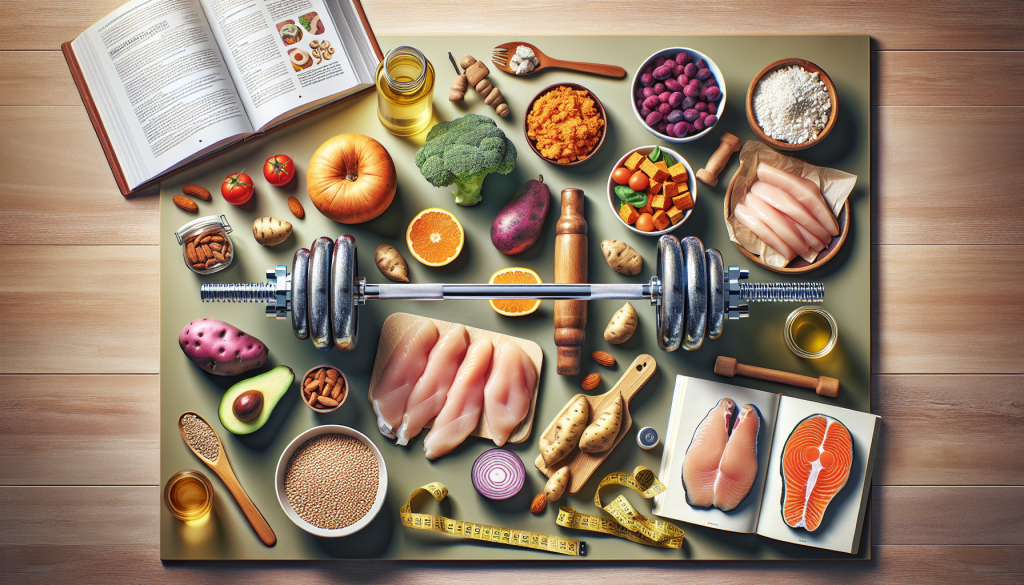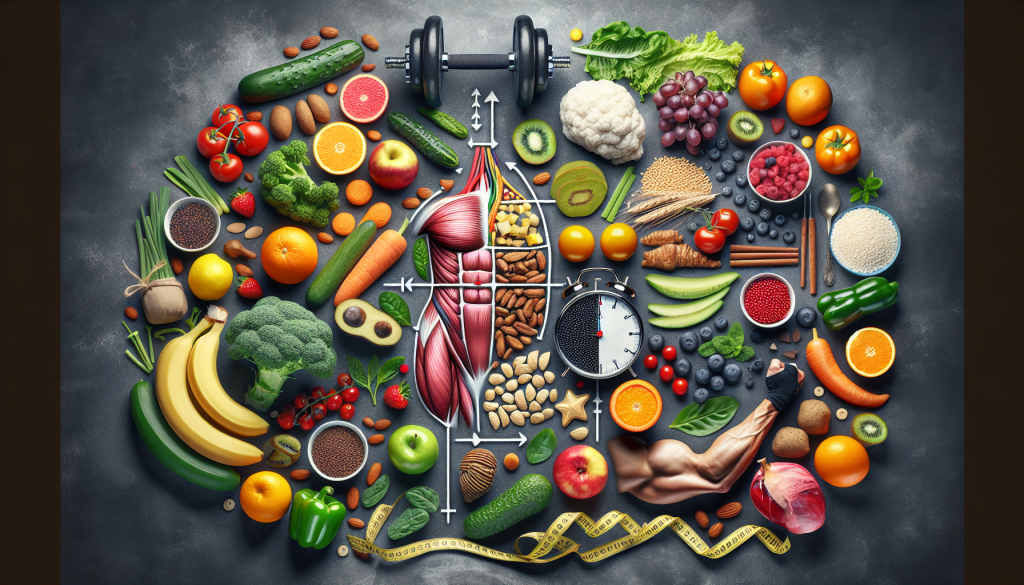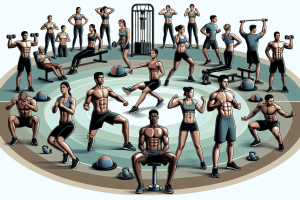If you’ve ever wondered how important diet is in achieving a chiseled, muscular body, you’re not alone. Building six-pack abs and a strong core are goals that many people strive for, but often find themselves questioning the role their diet plays in the process. In this article, we’ll explore the significance of diet when it comes to sculpting a ripped physique and uncover the answers to common inquiries surrounding this topic. So, get ready to learn just how crucial your eating habits can be in achieving your fitness goals.

Importance of Diet in Achieving a Ripped Physique
When it comes to achieving a ripped physique, diet plays a crucial role. It not only affects our overall health but also directly impacts our body composition. Building muscle and losing fat require a well-balanced and carefully crafted diet plan. In this article, we will explore various aspects of diet that are essential for achieving a ripped physique.
1. Balancing Calorie Intake
Determining Caloric Needs
Before you can begin your journey towards a ripped physique, it’s important to determine your caloric needs. Your daily caloric needs depend on various factors such as age, height, weight, activity level, and metabolism. Calculating your Total Daily Energy Expenditure (TDEE) will give you an estimate of how many calories your body needs to maintain its current weight.
Creating a Calorie Deficit
Once you have determined your caloric needs, creating a calorie deficit becomes crucial to lose body fat. A calorie deficit occurs when you consume fewer calories than your body requires. This deficit forces your body to utilize stored fat as an energy source, leading to fat loss. However, it’s important to create a moderate calorie deficit to ensure sustainable weight loss and prevent muscle loss.
Understanding Energy Balance
Maintaining a balanced energy intake is essential for achieving a ripped physique. Energy balance refers to the balance between the calories you consume and the calories you expend. A negative energy balance, resulting from consuming fewer calories, leads to fat loss, while a positive energy balance, consuming more calories, leads to muscle gain. Understanding and maintaining energy balance is crucial to achieve your desired physique.
2. Tracking Macros and Micros
Importance of Macronutrients
Macronutrients, namely carbohydrates, proteins, and fats, are the building blocks of our diet. Each macronutrient plays a unique role in our body’s functions and achieving a ripped physique. Carbohydrates provide energy for workouts, proteins aid in muscle recovery and growth, and fats support hormonal balance and overall health. Tracking macros ensures you are providing adequate nutrients to fuel your body for optimal performance.
Choosing High-Quality Foods
In order to achieve a ripped physique, it’s important to focus on consuming high-quality foods. Opt for nutrient-dense foods that are rich in vitamins, minerals, and antioxidants. These foods include lean proteins, complex carbohydrates, and healthy fats. Avoid processed and refined foods as they are often high in added sugars, unhealthy fats, and lack the essential nutrients your body needs.
Micronutrient Considerations
While macronutrients play a significant role, don’t forget about the importance of micronutrients. Vitamins and minerals are essential for various bodily functions, including metabolism, energy production, and immune function. Ensure your diet includes a variety of fruits, vegetables, and whole grains to meet your micronutrient needs and support overall health.
3. Adequate Protein Consumption
Protein Functions in the Body
Proteins are the building blocks of our muscles and play a crucial role in achieving a ripped physique. They are responsible for repairing and building muscle tissue, promoting satiety, and supporting various metabolic functions. Adequate protein consumption is vital for muscle growth and recovery, especially during periods of intense exercise or calorie restriction.
Calculating Protein Needs
To determine your protein needs, multiply your body weight in kilograms by a factor between 1.6-2.2, depending on your activity level and goals. This will give you the recommended daily protein intake in grams. Consuming high-quality protein sources such as lean meats, poultry, fish, eggs, dairy, and plant-based options like legumes and tofu will help you meet your protein requirements.
Sources of Lean Protein
To ensure you are getting an adequate amount of high-quality protein, incorporate lean protein sources into your diet. Lean meats like chicken breast and turkey, fish like salmon and tuna, and plant-based proteins like lentils, chickpeas, and quinoa are excellent choices. Including a variety of protein sources in your diet will provide essential amino acids necessary for muscle growth and recovery.

4. Hydration and Water Intake
Water’s Role in Metabolism
Staying hydrated is essential for overall health and plays a significant role in achieving a ripped physique. Water is involved in various metabolic processes, including digestion, nutrient absorption, and waste elimination. Proper hydration aids in maintaining an optimal metabolic rate, ensuring efficient calorie utilization, and promoting fat loss.
Benefits of Staying Hydrated
Aside from its role in metabolism, adequate water intake offers several benefits for achieving a ripped physique. Staying hydrated can help suppress appetite, reduce water retention, enhance physical performance, and promote overall well-being. Additionally, it keeps your muscles hydrated, aiding in muscle recovery and preventing fatigue during intense workouts.
Determining Water Intake
Determining your water intake can vary depending on factors such as age, activity level, climate, and overall health. A general guideline is to consume at least 8 cups (64 ounces) of water per day. However, this value can increase during periods of intense physical activity or in hot weather conditions. Pay attention to your body’s thirst cues and aim to drink water consistently throughout the day.
5. Benefits of Nutrient Timing
Pre- and Post-Workout Nutrition
Nutrient timing refers to the strategic timing of macronutrient intake before and after workouts. Consuming a balanced meal or snack before a workout provides the necessary energy to fuel your exercise session. It helps optimize performance, prevent muscle breakdown, and enhance recovery. Similarly, consuming a combination of protein and carbohydrates after a workout aids in muscle repair, glycogen replenishment, and nutrient delivery to promote muscle growth and recovery.
Eating Frequencies and Meal Timing
In addition to pre- and post-workout nutrition, the frequency and timing of meals also play a role in achieving a ripped physique. Some individuals opt for intermittent fasting, where they restrict their eating window to a specific time period. Others prefer eating smaller, more frequent meals throughout the day. Find an eating pattern that works best for your individual needs and goals.
Effect on Muscle Recovery and Growth
Proper nutrient timing can significantly impact muscle recovery and growth. Consuming the right nutrients at the right time ensures your muscles have the necessary fuel for repair and growth. By supplying your body with the right nutrients post-workout, you can enhance muscle protein synthesis, reduce muscle soreness, and optimize recovery, leading to improved muscle mass and definition.

6. Importance of Fiber Intake
Role of Fiber in Digestion
Getting an adequate amount of dietary fiber is crucial for achieving a ripped physique. Fiber plays a crucial role in digestion, promoting regular bowel movements and preventing constipation. Additionally, it slows down the digestion and absorption of macronutrients, contributing to better blood sugar control and appetite regulation.
Benefits for Satiety and Weight Management
Increasing your fiber intake can also promote satiety and aid in weight management. High-fiber foods take longer to digest, keeping you feeling fuller for longer periods of time. This can help prevent overeating and unnecessary snacking, contributing to calorie control and weight loss. Foods rich in fiber include fruits, vegetables, whole grains, legumes, and nuts.
Choosing High-Fiber Foods
Including a variety of high-fiber foods in your diet is essential for reaping the benefits of fiber intake. Focus on consuming whole grains like quinoa, brown rice, and oats, as well as plenty of vegetables and fruits. Legumes such as lentils, chickpeas, and black beans are also excellent sources of fiber. Incorporating these foods into your meals will not only support digestion but also contribute to overall health and well-being.
7. Managing Carbohydrate Consumption
Understanding Carbohydrates’ Functions
Carbohydrates are the primary source of energy for our bodies, making them an essential component of a diet aimed at achieving a ripped physique. They provide the fuel necessary for intense workouts and support the recovery and growth of muscles. However, not all carbohydrates are created equal, and it’s important to be mindful of the types and amounts consumed.
Determining Carbohydrate Needs
To determine your carbohydrate needs, consider your activity level and goals. Higher intensity and longer duration workouts may warrant higher carbohydrate intake. Aim to consume complex carbohydrates like whole grains, fruits, and vegetables, as they provide sustained energy, fiber, and essential nutrients. Avoid excessive consumption of simple carbohydrates found in sugary snacks and processed foods, as they can lead to energy crashes and hinder progress towards a ripped physique.
Types of Carbohydrates to Focus On
Incorporating complex carbohydrates into your diet is essential for achieving a ripped physique. These types of carbohydrates provide a steady release of energy, help sustain blood sugar levels, and promote overall health. Choose carbohydrates like sweet potatoes, quinoa, brown rice, and whole wheat products to fuel your workouts and support muscle growth while maintaining a balanced diet.

8. Effect of Fats in Body Composition
Differentiating between Good and Bad Fats
Fats often have a bad reputation, but they play a crucial role in achieving a ripped physique. It’s important to differentiate between good and bad fats. Good fats, such as monounsaturated and polyunsaturated fats, are essential for hormone production, brain function, and overall health. Bad fats, such as trans fats and excessive saturated fats, can lead to health issues and hinder progress towards a ripped physique.
Determining Fat Intake
While protein and carbohydrates often take the spotlight, fat intake is equally important for achieving a ripped physique. Aim to consume moderate amounts of healthy fats, making up approximately 20-30% of your total daily caloric intake. Include sources such as avocados, nuts, seeds, olive oil, and fatty fish like salmon. These fats provide essential omega-3 fatty acids and support overall health and body composition.
Benefits for Hormonal Balance
Consuming healthy fats is vital for hormonal balance, which plays a key role in achieving a ripped physique. Hormones such as testosterone, growth hormone, and insulin play important roles in muscle growth, recovery, and fat metabolism. Including sufficient amounts of healthy fats in your diet can help optimize hormone production and support the overall balance necessary for reaching your physique goals.
9. The Role of Supplements
While a well-balanced diet is the foundation for achieving a ripped physique, certain supplements can complement your efforts. However, it’s important to remember that supplements should never replace a healthy diet. They should be used to fill any nutritional gaps and support specific goals. Popular supplements for individuals looking to achieve a ripped physique include protein powder, creatine, branched-chain amino acids (BCAAs), and omega-3 fatty acids.

10. Importance of a Balanced Approach
Avoiding Extreme Dieting
Achieving a ripped physique is a journey that requires patience, consistency, and a balanced approach. Avoiding extreme dieting methods or restrictive eating patterns is crucial for long-term success. Extreme calorie deficits or excessive exercise can lead to muscle loss, nutrient deficiencies, and unsustainable habits. Focus on making sustainable lifestyle changes that can be maintained in the long run.
Sustainability and Long-Term Results
Sustainability is key when it comes to achieving and maintaining a ripped physique. Crash diets or short-term approaches may lead to temporary results but are unlikely to be maintained in the long run. Instead, focus on establishing healthy habits that you can enjoy and sustain for a lifetime. Gradual changes and realistic goals will lead to long-term success in achieving a ripped physique.
Considering Psychological Well-being
Lastly, it’s important to consider your psychological well-being when embarking on a journey towards a ripped physique. Extreme focus on dieting and physical appearance can lead to an unhealthy relationship with food, body image issues, and mental stress. Remember to prioritize self-care, practice mindfulness, and seek support when necessary. A balanced approach that encompasses both physical and mental well-being is essential for long-term success and overall happiness.
In conclusion, achieving a ripped physique requires more than just hitting the gym. Diet plays a critical role in determining body composition and reaching your goals. From balancing calorie intake to tracking macros, ensuring adequate protein consumption, staying hydrated, and considering nutrient timing, every aspect of your diet contributes to your success. Incorporating high-quality foods, managing carbohydrates and fats, and understanding the role of supplements will further enhance your progress. However, it’s crucial to maintain a balanced approach, considering both physical and mental well-being, to achieve sustainable and long-term results. With dedication, consistency, and a well-structured diet, you can transform your physique and achieve the ripped body you desire.





